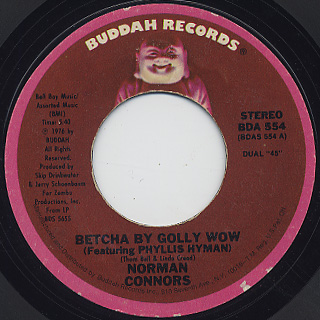

On Monday, December 15th, 2008 at 4:07 am and is filed under Classic. May we all taste the joy of love.Īll the Norman Connors tracks are available on The Best of Norman Connors except for “Invitation,” which is the title track of the out of print 1979 album Invitation. This week Norman Connors demonstrates music doesn’t have to be profound to be deep-here is the soundtrack for the deeptitude of romance. Last week, writing about Hugh Masekela, I said music doesn’t have to be great to be good. We ran a major article highlighting Jean Carn over three years ago, about a month before Katrina hit. I ended up going with Phyllis mainly for non-musical reasons. “Butterfly” features Eleanor Mills and James Robinson.Ī final quick note-I had a hell of time choosing between “Dindi” by Jean Carn and “Betcha By Golly Wow” featuring Phyllis Hyman (pictured above on the yatch with Norman). “This Is Your Life” features Eleanor Mills. “Betcha By Golly Wow” features Phyllis Hyman. “Valentine Love” features Michael Henderson and Jean Carn. “Invitation” features Ada Dyer (listed as “Adaritha,” her birth name). “You Are My Starship” features Michael Henderson. I have collected here most of my favorite Norman Connors projects. The pop format invites early obsolescence-there is always something newer to listen to-but this music’s striking success at digging out jeweled nuggets from the common clay of daily life makes Connors’ musical contributions shine long, long after many other pop songs have faded.ĭuring the seventies Norman Connors gifted us with music that became a staple of late night black radio. The instrumentalists (particularly saxophonist Gary Bartz) brought both emotional depth and technical complexity to what otherwise could have been sonic wallpaper, and cheap wallpaper at that. The vocalists (particularly Jean Carn, Phyllis Hyman and Michael Henderson) were absolutely great at fulfilling the niche Connors was carving. Connoers’ great talent was using distinctive voices. One thing Norman Connors understood from his jazz days is that you needed good musicians if you were going to consistently produce good music. Producing hip pop was no more easy than producing hip jazz-it was just a different discipline. Besides, pop also had its own complexity. Fortunately, Norman Connors understood a deep concept we detractors had yet to grasp: popular music while less technically complex was no less valid than jazz, or classical, or any other music. Generally it was thought that the young man was playing beneath himself, wasting his prodigious talent on rather rudimentary music. Many of us jazzheads pooh-poohed Norman’s decision. You don’t have to listen to the music to hear what he was doing, you can just look at the covers and you’ve got the concept. In 1975, a few solidly received jazz albums under his belt, our man decided on a different direction and began producing sophisticated Soul music. He produced Dance of Magic featuring the luminous vocals of Dee Dee Bridgewater.

Pharoah Sanders took him on the road and by 1972 Buddah’s Cobblestone label offered him a contract.

Gigged with a bunch of greats and got his recording feet wet on Archie Shepp’s The Magic of Juju.

Went to Temple University in Phily and Juilliard School of Music in New York. Clean and stylish as he want to be and with an unashamed inclination toward the good things in life.įor a minute it looked like he was going to be a hard jazz fiend-while in junior high school he sat in with Trane in place of a missing Elvin Jones. He’s a drummer from Philly, so you know he got jazz in his blood. Maa young Pisces swam into the world, ready to go with the flow no matter whichsoever way the current was going. NORMAN CONNORS featuring PHYLLIS HYMAN / “Betcha By Golly Wow”


 0 kommentar(er)
0 kommentar(er)
